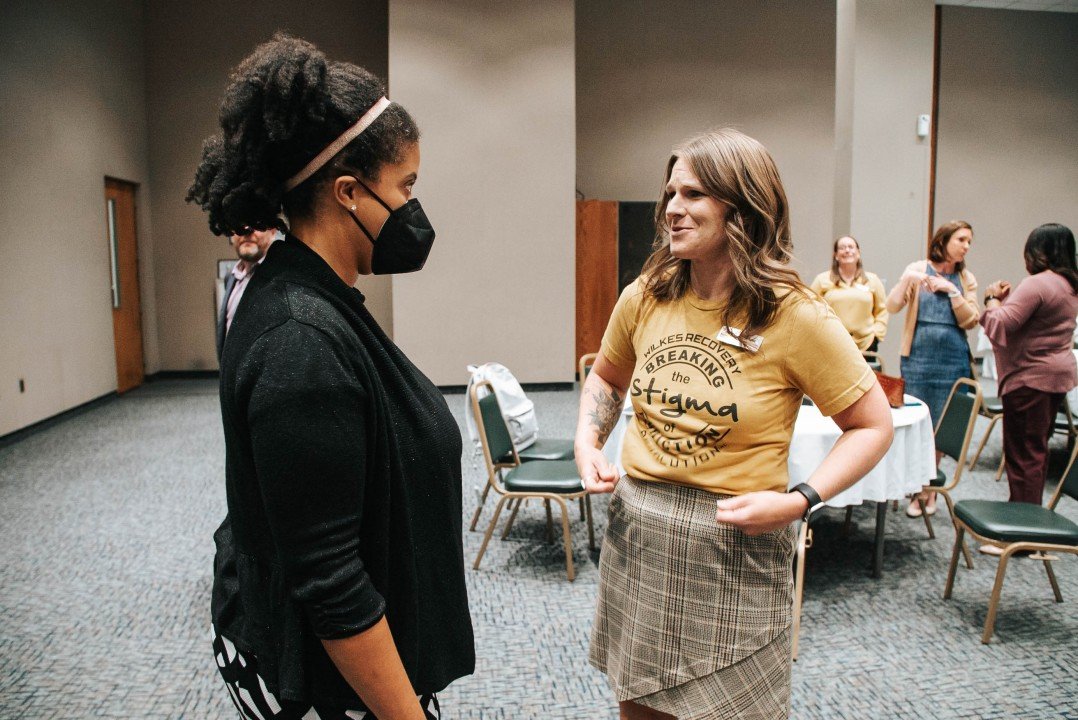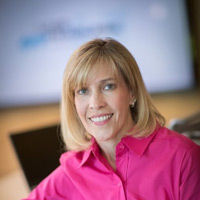Community strategies support substance-use recovery in North Carolina

I was born in North Carolina. I’ve more or less spent my entire life here.
You’d think the state would have few surprises left for me. But when I joined the Blue Cross and Blue Shield of North Carolina (Blue Cross NC) Extra Miles Tour, I was given the opportunity to look at my home through a new lens. I rediscovered that there is always something new waiting to be found just around the corner.
Having grown up in a rural community, it’s been no surprise to hear that small towns in every pocket of our state are grappling with the same mental health crisis and substance use disorders affecting the entire country.
I haven’t been surprised to hear that stigma is a significant force in small towns, making it more difficult for people and their families to seek help. People in rural communities are often more susceptible to the fear of what their neighbors, co-workers, and employers might think.
What has surprised me has been the innovation and commitment – unfolding in different ways across the state – to change the narrative. New programs in rural areas now embrace the peer-support approach and community-based strategies.
This is helping North Carolinians understand that getting support for mental health needs isn’t weakness. It’s strength, powerful enough to improve lives, keep families together, and make communities whole.
Connections to peers and the community support recovery
When it comes to promoting well-being, no one is alone. It’s work we all have to do, in some form or another. And, it’s work that few people can succeed at when they do it alone.
When we traveled to Robeson County early in the Tour, we saw what’s possible when the healing process:
- grounds the individual in the community
- helps people learn from others who’ve had shared experiences
- supports people to draw energy – rather than shame and stigma – from the community at large
In response to rising numbers of opioid-related overdoses, the Lumbee Tribe established its Opioid Peer Support Specialist Program. The program embraces a holistic approach to healing that connects individuals in recovery with professional resources, community support, and tribal traditions.
In addition to providing access to clinical services and a hotline for support in non-emergency situations, the response team works with the Lumbee Tribe Cultural Center to offer a cultural healing component:
- Activities such as gardening and fishing that cleanse by letting the client spend meaningful time in a culturally sound environment.
- Traditional American Indian services that are meant for cleaning and healing, including time spent in a sweat lodge. This activity purifies both physically (through the act of sweating) and spiritually (through time spent in reflection, with the creator).
- Smudging ceremonies that use four basic medicines – sage, sweet grass, tobacco, and cedar – to cleanse a person of negative thoughts and feelings.
- Talking circles, which provide opportunities for communal support and healing.
What’s more, the Lumbee Tribe’s Peer Support Program uses professionally trained peer-support specialists, who help guide what happens during the talking circles and group events. They plan programming that, at first glance, might not seem related to the work of recovery, but which play a vital role in supporting sobriety by addressing the needs of the whole person:
- nutritional health and diabetes awareness
- ways of giving back to the community
- goal setting
- how to reimagine what it means to have fun
I understand how important faith, community and cultural connections, and peer support are to unlocking powerful healing forces. Visiting the Lumbee Tribe was an opportunity to see these principles at work, but in a totally different cultural context from my own. It was an inspiration.
Communities can learn from one another
I don’t want to imply that there is a universal recovery experience or that every community should respond to mental health challenges in the same way. But strengthening a person’s sense of place works. Pushing back against stigma by opening up pathways for honest communication works. And there are opportunities out there for communities to learn from one another about effective strategies that help heal by nurturing that sense of connection.
Our journey westward to Wilkes County on a separate leg of the Extra Miles Tour showed what’s possible when efforts to make a difference in one community are guided by lessons learned in another.
In Wilkesboro, we met Devin Lyall, who founded Wilkes Recovery Revolution to meet the needs of a community that, at 1 point, didn’t have a single detox or treatment center within a 2-hour drive.
Devin knew all about the challenges of recovery in a rural area from personal experience: She became dependent on opioids after breaking her ankle in a skiing accident. In a community where mental health challenges simply weren’t discussed and with no local resources to turn to, Devin went to King’s Mountain for treatment and then moved into a transitional housing complex in Asheville.
Devin’s time in Asheville was an inspiration. She felt embraced by the community. People talked openly about their addiction with no stigma attached, and that sense of belonging was vital to her recovery. The positive experience set Devin out on a mission to bring that same sense of community and the same array of services to her hometown. She founded Wilkes Recovery Revolution so others could have the opportunity to heal at home in Wilkes, without having to choose between the services they need and the families and people they love.
Several years later, Wilkes Recovery Revolution has grown into a multidimensional recovery ecosystem. At its heart is the R3 Recovery Center, a safe space where anyone can enter and ask for help for themselves, a child, or a loved one. Peer support specialists work with these individuals to help them navigate the wide array of resources available through the organization, including 3 peer-driven transitional housing facilities and an employment assistance program that helps residents find jobs. There are wellness education workshops and work-study opportunities, including the Fresh Mobile Market, a collaborative with local farmers to provide underserved communities with access to healthy food. A harm reduction program offers wound care and syringe exchange to reduce infection and disease among users, along with free Naloxone kits to reverse opioid overdoses.
Think for a moment about the name of the organization Devin founded. Recovery isn’t a position of vulnerability and shame – it’s revolutionary. That empowerment comes from rediscovering one’s place in the community, with the support of others from the community.
Strength through partnership and collaboration
Our Extra Miles Tour has been based on the understanding that communication and connection builds coalitions. Coalitions solve problems. Going from 1 town to the other across the state, we’ve discovered exciting things that have happened when organizations and changemakers think outside the box and forge new partnerships. We’ve learned where there are opportunities for organizations and institutions to collaborate in new ways.
But few things have been as moving as hearing about how this same principle that’s driving such important work at the community-level and beyond is also impacting lives at the individual level. It’s happening in Robeson and Wilkes counties and in all the other communities where peer support approaches and strong social foundations are helping people overcome mental health challenges.
Maybe my most important takeaway from our work on the Tour so far has been the simple reminder that we’re all stronger when we work together.
Browse related articles


Blue Cross and Blue Shield of North Carolina does not discriminate on the basis of race, color, national origin, sex, age or disability in its health programs and activities. Learn more about our non-discrimination policy and no-cost services available to you.
Information in other languages: Español 中文 Tiếng Việt 한국어 Français العَرَبِيَّة Hmoob ру́сский Tagalog ગુજરાતી ភាសាខ្មែរ Deutsch हिन्दी ລາວ 日本語
© 2024 Blue Cross and Blue Shield of North Carolina. ®, SM Marks of the Blue Cross and Blue Shield Association, an association of independent Blue Cross and Blue Shield plans. All other marks and names are property of their respective owners. Blue Cross and Blue Shield of North Carolina is an independent licensee of the Blue Cross and Blue Shield Association.



